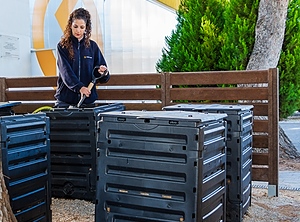AGRICULTURAL PLASTICS
Aimplas project to develop compostable plastics for Spanish farmers
 The methodology will be validated on three crops: artichokes, tomatoes and citrus fruits (Photo: Aimplas) |
Spanish plastics technology centre Aimplas (Valencia; www.aimplas.net) is involved in a project to develop new compostable plastics for the agricultural sector. Funded by the Valencian Innovation Agency (AVI, Valencia; www.innoavi.es), the Agro+ project is being led by compatriot agricultural co-operative Benihort (Benicarló; www.benihort.com) and the Institute for Plant Molecular and Cell Biology (IBMCP, Valencia; www.ibmcp.upv.es) at the Polytechnic University of Valencia.
According to Aimplas, Spain markets 14% of all agricultural films in Europe, considering all types. In the particular case of mulch, 80,000 t/y are placed on the market in Europe, and 20,000 t/y are used in Spain. The main problem with this product is its recovery at the end of its shelf life, since the resulting waste is highly contaminated with between 30% and 70% of waste impropers such as soil, stones and crop residues. Consequently, there is a lot of interest in using compostable plastics.
The Agro+ project is developing a pilot methodology to foster the use of compostable films and propose a waste management protocol for converting them into compost that can be reused by farmers for their agricultural production. The methodology will be validated on three different crops: artichokes, tomatoes and citrus fruits.
During the project, compostable mulch films are also being developed and optimised in terms of improving their degradation rates to ensure the compost’s quality, both at intermediate stages and at the end of the composting process. A protocol to standardise the recovery and management of the films is also being developed.
Earlier this year, the Medio Ambiente Agricultura y Plásticos (Mapla, Seville) association was created to organise a recycling system for agricultural plastics waste in Spain (see Plasteurope.com of 20.03.2020).
According to Aimplas, Spain markets 14% of all agricultural films in Europe, considering all types. In the particular case of mulch, 80,000 t/y are placed on the market in Europe, and 20,000 t/y are used in Spain. The main problem with this product is its recovery at the end of its shelf life, since the resulting waste is highly contaminated with between 30% and 70% of waste impropers such as soil, stones and crop residues. Consequently, there is a lot of interest in using compostable plastics.
The Agro+ project is developing a pilot methodology to foster the use of compostable films and propose a waste management protocol for converting them into compost that can be reused by farmers for their agricultural production. The methodology will be validated on three different crops: artichokes, tomatoes and citrus fruits.
During the project, compostable mulch films are also being developed and optimised in terms of improving their degradation rates to ensure the compost’s quality, both at intermediate stages and at the end of the composting process. A protocol to standardise the recovery and management of the films is also being developed.
Earlier this year, the Medio Ambiente Agricultura y Plásticos (Mapla, Seville) association was created to organise a recycling system for agricultural plastics waste in Spain (see Plasteurope.com of 20.03.2020).
27.04.2021 Plasteurope.com [247504-0]
Published on 27.04.2021
